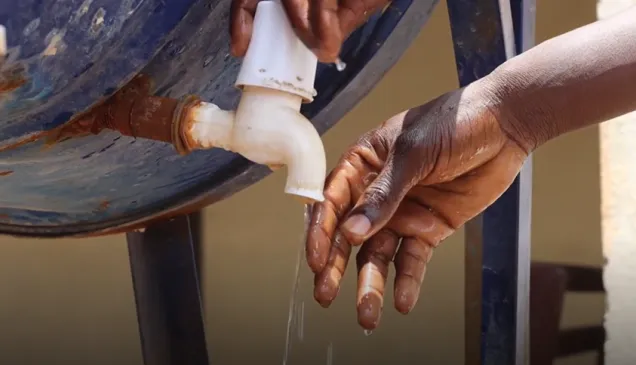Immense power of first aid training at school – a tool which saves and transforms lives
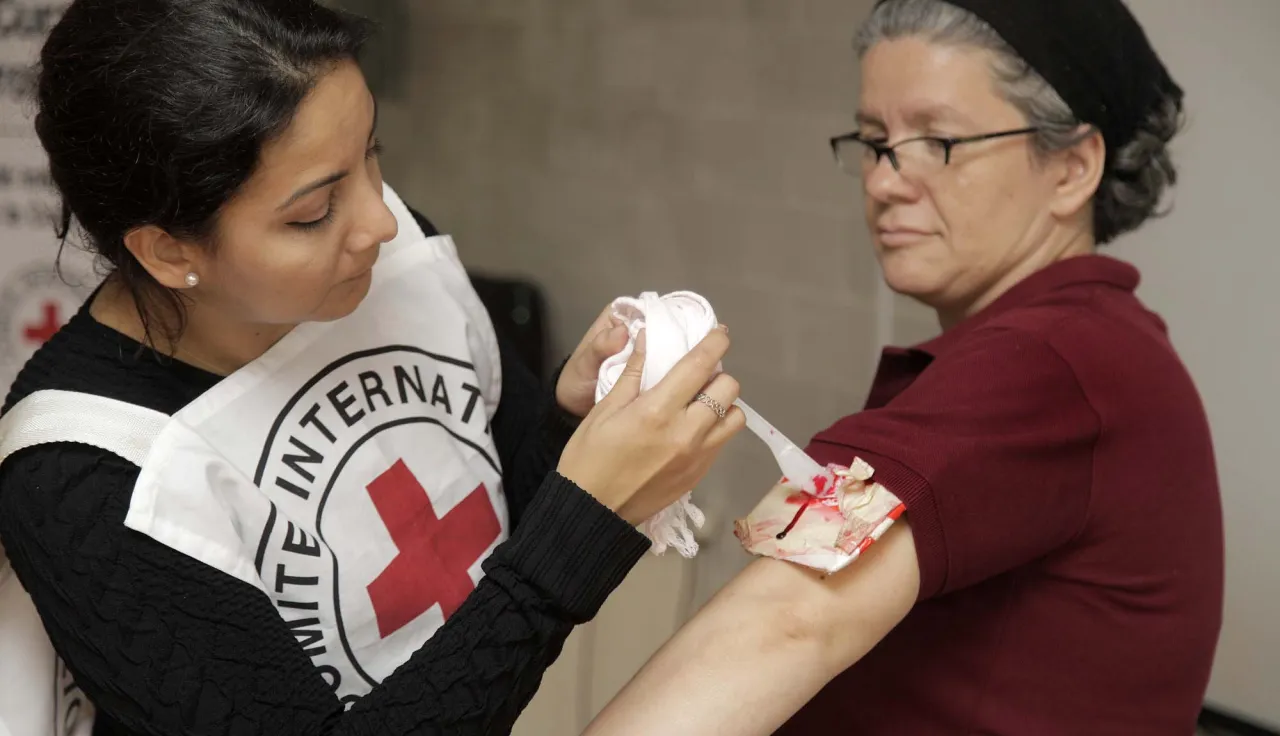
Everyone should learn essential first aid skills, particularly young people who are often the first responders in emergency situations. More lives could be saved if those first on scene were trained in administering first aid. This year, the World First Aid day is all about teaching first aid to children, teachers and the wider school community.
Schools are supposed to be safe places for children, where they learn and develop themselves. Unfortunately, the ICRC has seen that conflict and violence deeply disrupt education systems across the globe. Schools and education personnel are attacked, school buildings are used for military purposes and security incidents lead to a rise in panic in communities.
For precisely these reasons, the ICRC began its access-to-education programme. Established in 2017, the programme aims to ensure that children can continue or resume their schooling in areas which are heavily affected by armed conflict and other situations of violence.
One centrepiece of the ICRC's work is first aid training sessions in schools. First aid prepares teachers and children to treat injuries which may occur through security incidents or accidents. Students and teachers are excellent first aiders and train their peers around them. They bring these skills back to their families and communities.
The ICRC has interviewed students and teachers around the world who were trained in first aid. Let's hear why first aid is so important to them:
Khalida from Azerbaijan
"I feel safer and more confident now. I also carry a small first aid kit with me wherever I go."
Khalida Asgarova is 16-year-old student who wants to become a doctor. She lives in Aghdam in Azerbaijan. During the escalation of hostilities in the autumn of 2020, her village was attacked. Houses, cars and the school were damaged, and the entire community had to flee. Khalida lost her father to the violence.
At school this spring, she participated in first aid training sessions conducted by the ICRC and the Azerbaijani Red Crescent Society. One important lesson she learned was that in emergency situations everyone must take care of themselves first before helping others.
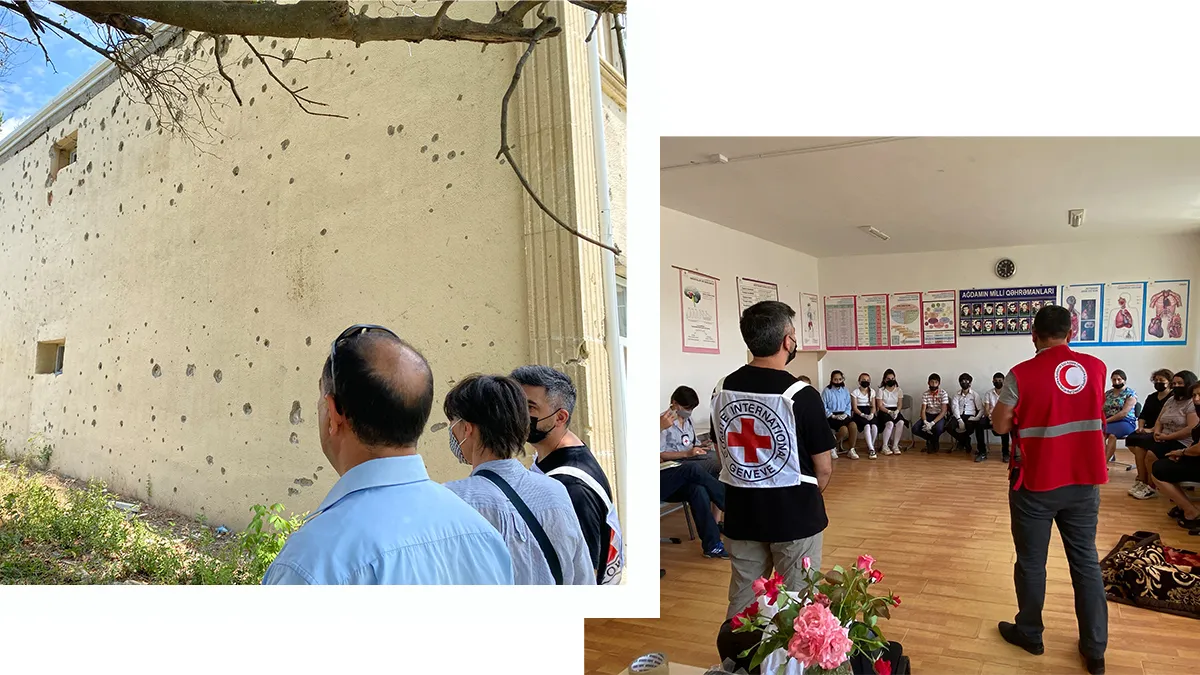
School building damaged by the fall 2020 escalation (left). ICRC and Azerbaijani Red Crescent Society give first aid training, as part of the school first aid programme (right). Karla HOOVER/ICRC
Since attending the session, Khalida has already helped her friend who hurt his hand with broken glass. She was able to stop the bleeding and bandaged the wound herself. She taught some of the other students who could not attend the session as well as her younger cousins some of the skills she acquired.
Khalida felt the training sessions were important since teachers and students lacked proper knowledge and therefore carried out some of the techniques incorrectly. For instance, before receiving the training, she tried to help a student who lost consciousness at school and realized in retrospect that she should have reacted differently.
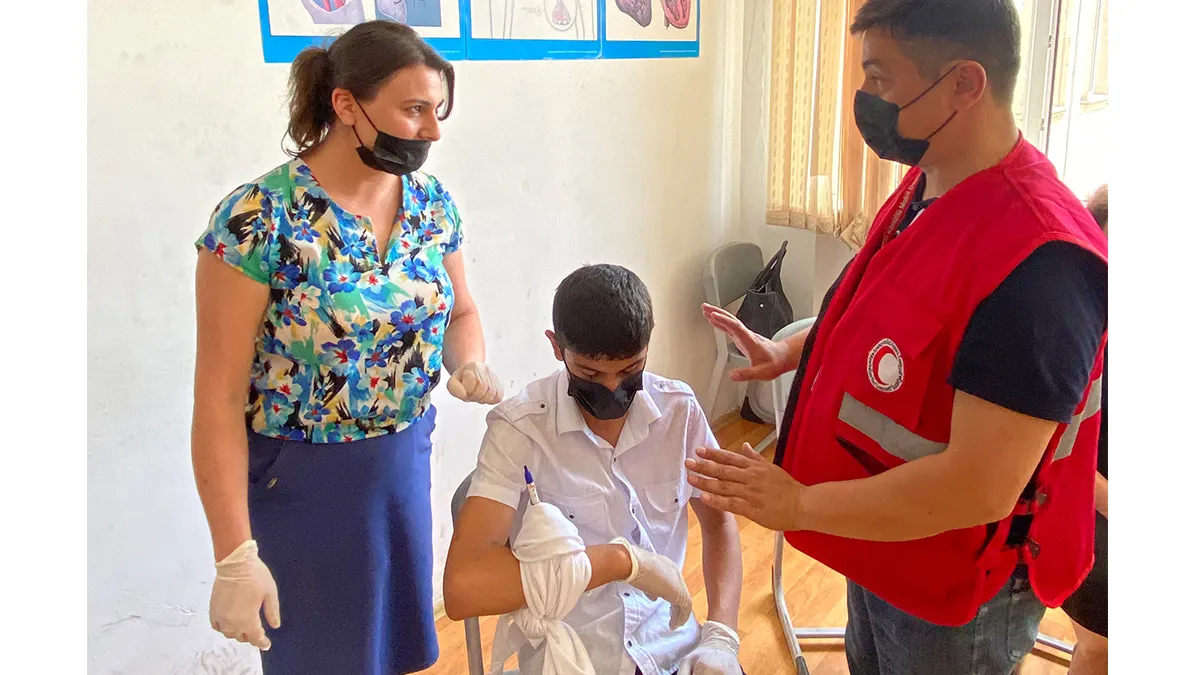
Participants practice how to stop bleeding and bandage a wound. Karla Hoover/ICRC
Marisela from Venezuela
Marisela Mujica is the clerkship and citizenship coordinator of the Jesus Maestro school, which is part of the "Fe y Alegria" network. The school located in Venezuela is in one of Caracas' neighbourhoods. She is part of the directive team and manages the relationship between the school and the community.
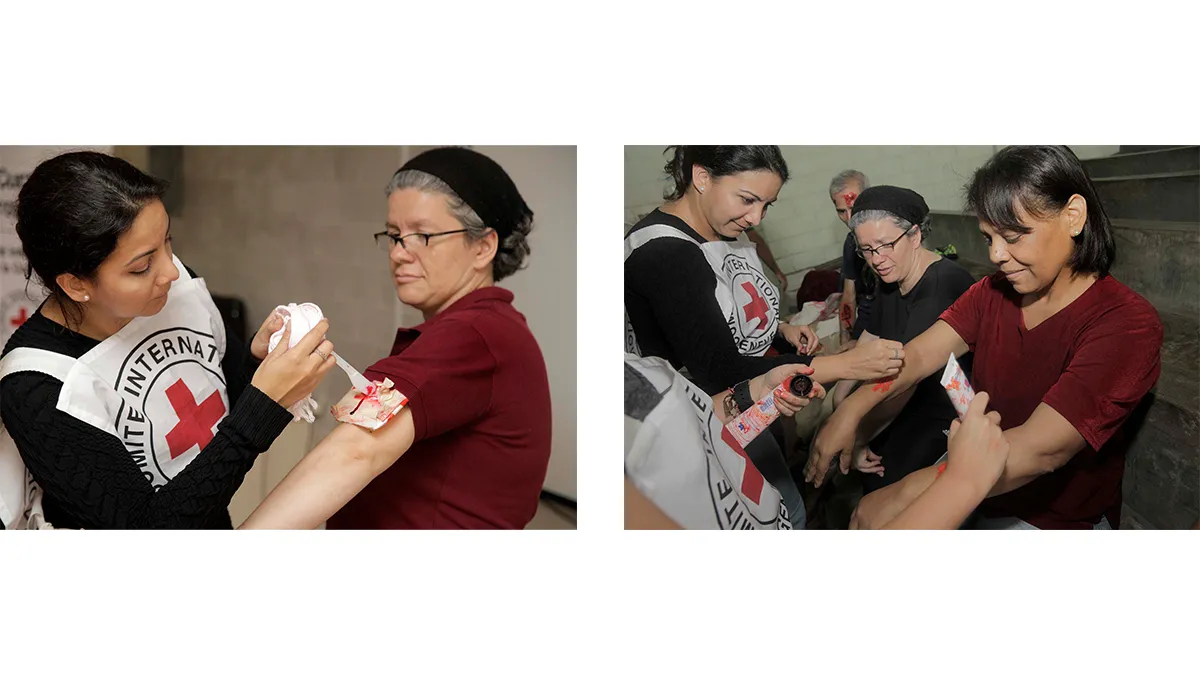
An ICRC first aid field officer shows Marisela (in the red t-shirt) how to bandage a wound (left). Participants learn how to treat wounds, burns, fractures and other emergency injuries during the drill preparation (right). ICRC
The regular confrontations between armed groups and between the police and gangs generate a lot of fear and stress among community members. Marisela specifically remembers one severe incident that occurred in May last year which lasted several days. Shootings in their area made children and teachers leave school. They were not able to go back for twenty days.
Since then, Marisela and everyone in school is afraid that the clashes will happen again. Everyone is now more aware that these could occur at any moment. Marisela describes that they felt as if they were in the middle of a warzone, listening for many hours to continuous shootings.
The confrontations made everyone nervous. Many people had to flee their houses. Those who couldn't leave had to hide under their beds from the bullets.
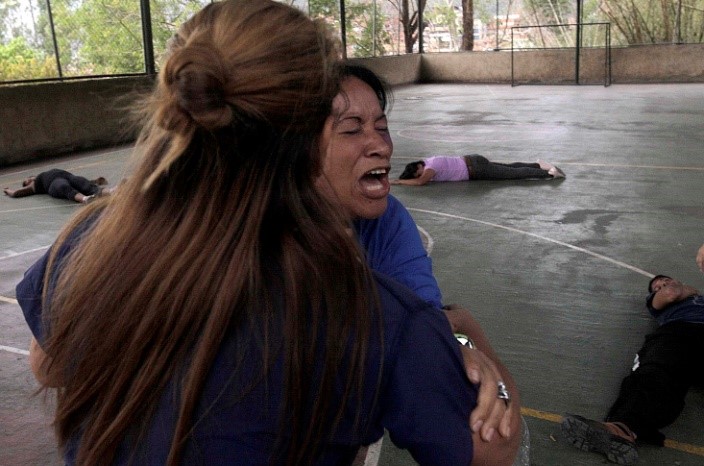
Participants learn how to deal with affected community members who are psychologically distressed. ICRC
The most important thing Marisela learned from the first aid course was to remain calm in order to look after herself and only to do what makes her feel safe at the moment. She also explains that some of the first aid techniques they knew before were wrong. For example, treating a snake bite. After attending the course, she does not only feel safer but also more accomplished, since several colleagues have been trained.
Since the sessions, Marisela and her colleagues have already treated small injuries such as sprains and scratches and even a fracture. Some of the teachers have asked students to present some first aid techniques to their classmates. Most importantly, however, teachers have been able to instruct the children how to behave safely during shootings.
Marisela fervently wishes for the day her students can return to school safely after COVID-19. She wants to continue passing on her knowledge to children, but also to teach them values related to healthy emotions and coexistence. Marisela paints a picture where she would like to see the playground full of children, playing and running, representing our new generation.
Former child soldiers from Congo
"During the training sessions, these children feel loved, and they do not hesitate to express that clearly during the sessions. I remember that at the last training, one of them said that he could have never imagined that a large organization like the ICRC could think of him and his peers and to offer them training, since they are considered bandits by their communities.
First aid does not only make schools safer — but it can also empower children as a form of education in itself. Unlike Khalida and other students we have spoken to, many children around the world are not even able to attend school. This is especially the case for children who used to be a part of the armed groups in the Democratic Republic of the Congo.
These children are excluded from society and banned by their communities with no chance to grow up like 'normal' children do. They do not have the 'safe haven' of school and mostly no more homes with little to no opportunity to learn, play, relax or express themselves.
As an impartial organization, the ICRC integrates children who left armed groups into our first aid training sessions. We train children released from armed forces and groups at the BVES centre girls-boys in Goma and the Heri-Kwetu centre in Bukavu.
These sessions give children a chance to regain their voices and return to their communities to lead a normal life again. Due to the constant conflict that terrorises the people, a person with life-saving skills has a greater chance to be welcomed and reintegrated into their community. Children who decide to return to school can help their struggling peers in providing first aid where possible and teach and share with them these techniques. In this process, they gain respect, confidence and a bigger reach in saving lives for all.
First aid training sessions must be accessible to all without discrimination. Each person must be able to perform the actions that save lives. It is an essential humanitarian act that allows people to save lives and recover from an unexpected injury or disaster.
Children must be able to prevent, identify and avoid risks during their daily lives. They should be aware of road safety rules, identify hazards at home or school, or in their community and in their environment and how to respond to an emergency, incident or accident.
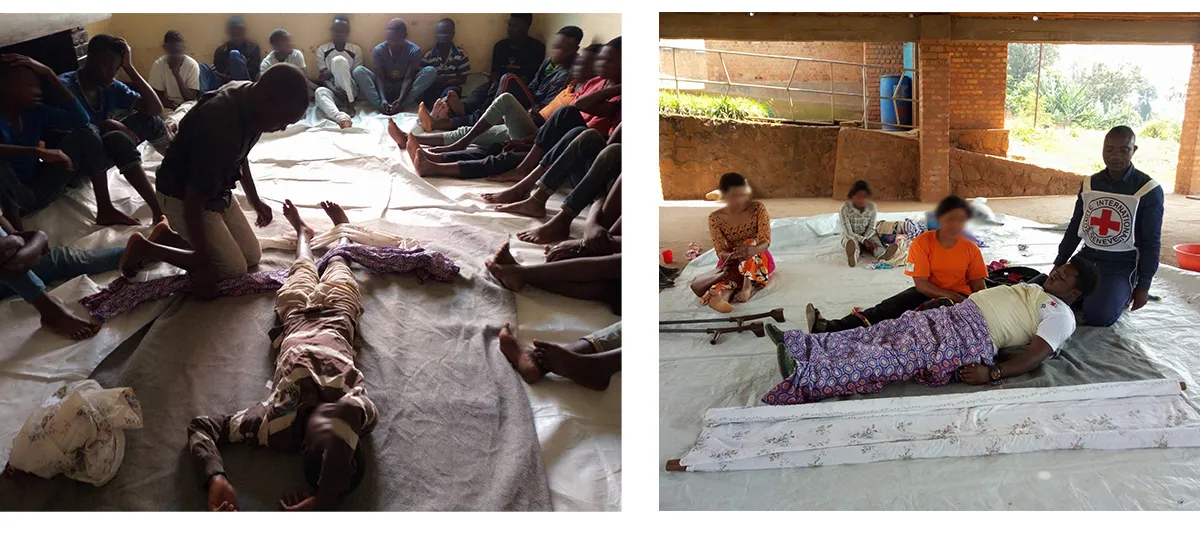
They do not have the 'safe haven' of school and mostly no more homes with little to no opportunity to learn, play, relax or express themselves.
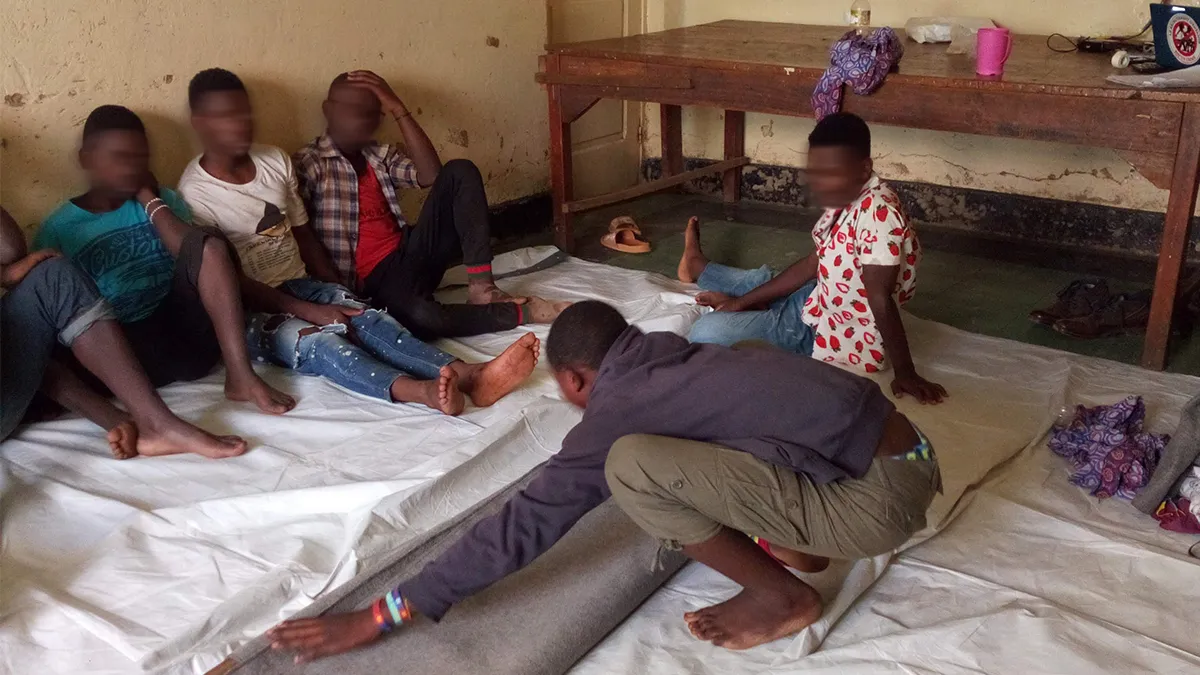
Regardless of how different their stories are and what challenges they may encounter in daily life, Khalida, Marisela and the former child soldiers from DRC have shown how powerfully first aid training sessions give back individuals and school communities the feeling of safety, confidence and resilience, which they have always carried within themselves.
These activities show the positive impact that the ICRC can bring by intervening for affected people and how by working together, the Access to Education and First Aid programmes can bring material changes to these children's lives despite conflict, violence and marginalization.


